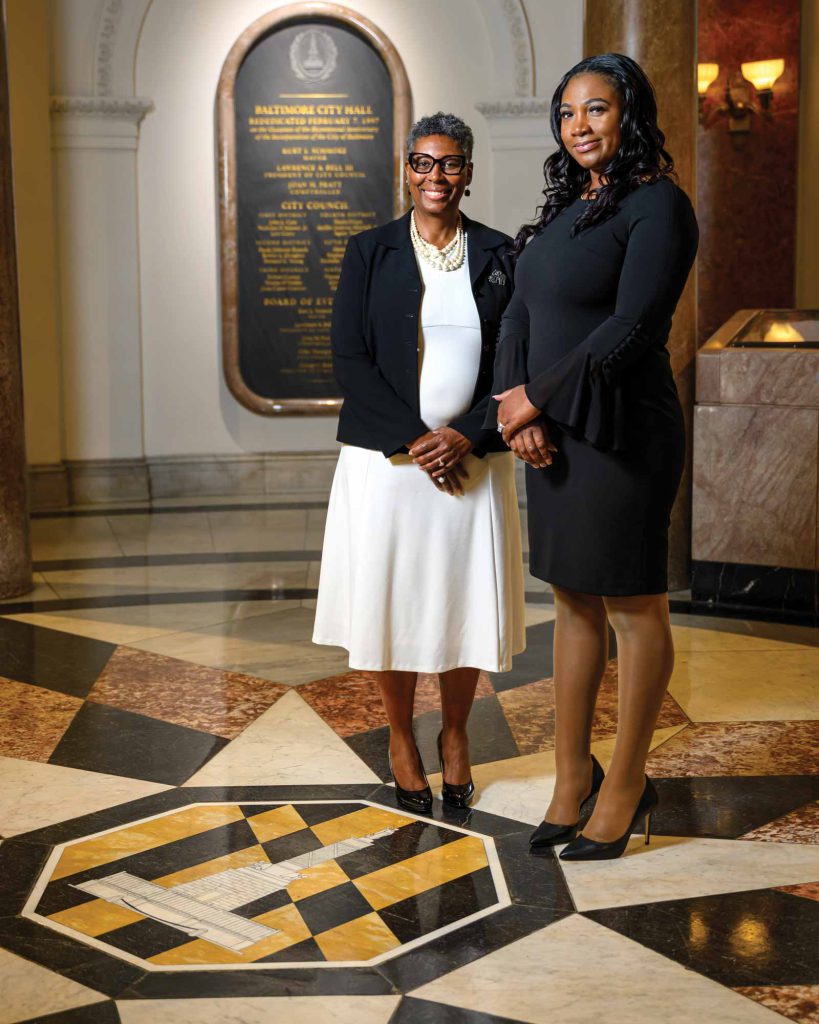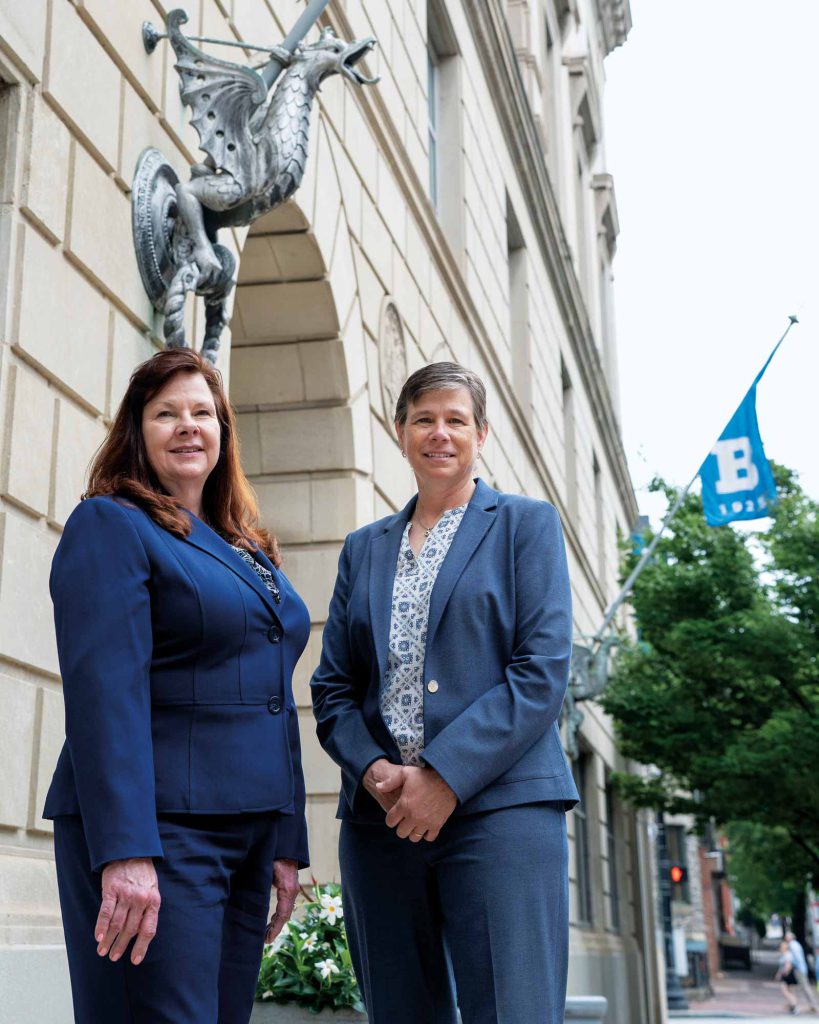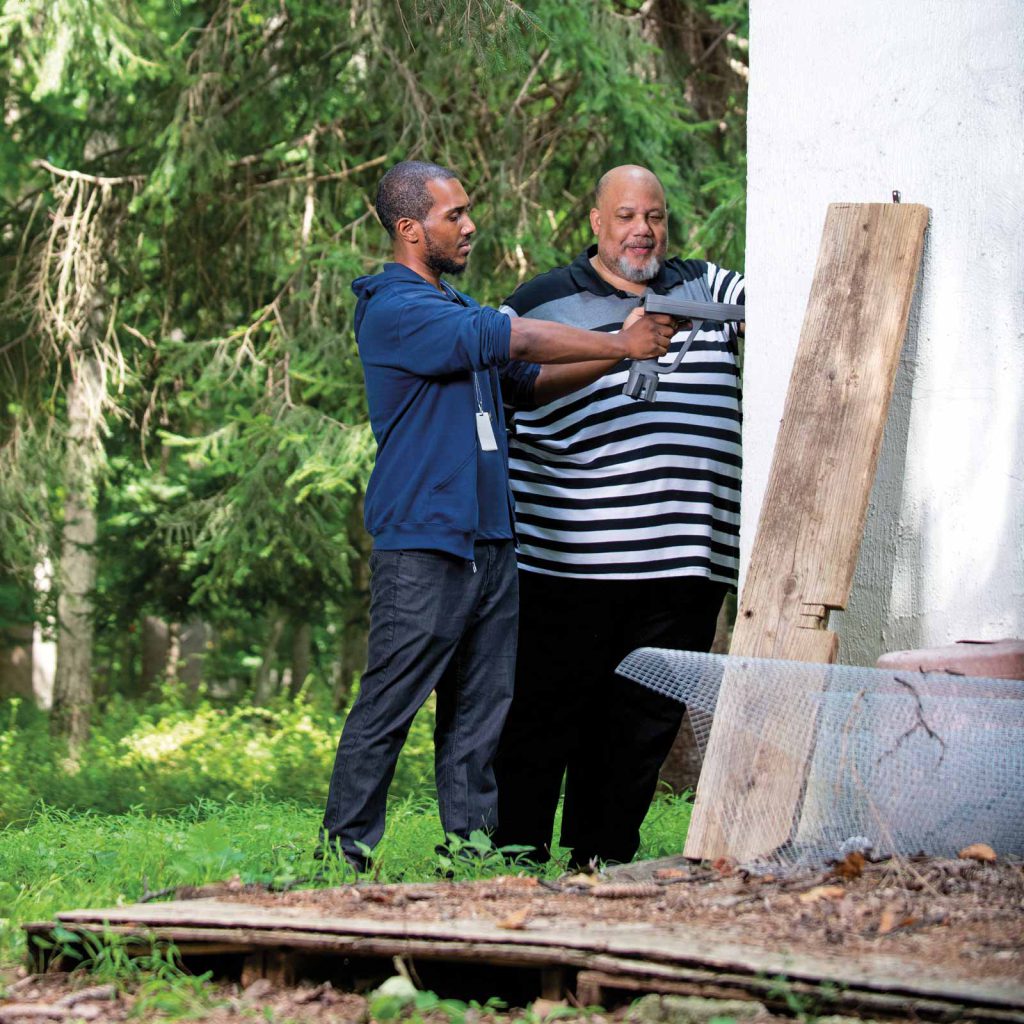UBalt’s newest initiative defines the next generation of internships for students and employers.
BY MATTHEW LIPTAK

A year ago, Dr. Ann Cotten, B.S. ’85, M.S. ’86, CERT ’92, D.P.A. ’03, director of The University of Baltimore’s Schaefer Center for Public Policy, and Dr. Roger Hartley, dean of the College of Public Affairs, co-authored an opinion piece for The Baltimore Sun addressing the “solvable problem” of unpaid internships and unveiled the University’s ambitious and sweeping solution.
Now entering its second year, the NextGen Leaders for Public Service program gives undergraduate and graduate students from all majors at UBalt the opportunity to explore a career in public service. The program comprises a variety of academic and co-curricular initiatives, but NextGen’s unique paid internship opportunities are the cornerstone.
In their op-ed, Cotten and Hartley acknowledged that “for predominantly minority schools like ours, the unpaid internship is a critical barrier to entry to employment, as well as a lost opportunity for employers to diversify their workplace,” and asked, “Is there a better way to do two important things at once—improve services and have those services delivered by qualified employees who started as students in need of an opportunity?”
Jeanette Brown, B.A. ’22, was one such student. Prior to coming to UBalt in 2019, this Baltimore mom’s education and employment experience was fairly limited to administrative assistance. Brown shared: “I graduated with a degree in Interdisciplinary Studies. During that time, I discovered I really loved public policy work. So, I came back to get my master’s in public administration.”
But as she settled into her first semester, she encountered a problem common to many students—securing a job in her field without prior experience. For Brown, and students like her, NextGen was the answer.
“I love what I do and the feeling that I’m helping my community. That is very important to me, and a career in public service is my way to do that.”
JEANETTE BROWN
The College of Public Affairs has previously supported internship programs as part of the University of Baltimore’s commitment to experiential learning, but nothing of this scope.
The new program was the brainchild of Dean Hartley. Together, he and Cotten undertook the challenge of building a pilot program. “I hatched this idea years ago when I worked in a business school back at the University of Arizona,” Hartley said. “I thought it would be great to have something like an entrepreneurship center, but for colleges of public service, where students could get the same type of support and mentoring.”
While the Schaefer Center already had long-standing relationships with partner organizations across Maryland, its current experiential model needed refining. When they learned of the Volcker Alliance’s NextGen Service Corps, Hartley and Cotten knew they had found a missing piece of the puzzle.
Founded in 2013 by former Federal Reserve Board Chairman Paul A. Volcker, the Alliance is a university and government partnership with a mission to “empower the public sector workforce to solve the challenges facing our nation.” It currently supports 17 affiliated universities, including the University of Baltimore, through NextGen Service, and helps students explore careers in public service.
Combined with fiscal support from the state, the Schaefer Center’s reputation and relationships with government and nonprofit organizations across Maryland has enabled the NextGen program to skyrocket in its first year, even earning national attention for the strength of its intern placements, according to Cotten and Hartley.
The overwhelming success of the pilot program proved fortuitous for Jeanette Brown. The graduate student was in the right place at the right time when she approached NextGen Program Manager Pat Mikos, M.P.A. ’11, about her program’s internship requirement.
The two discussed various placement options and settled on the Mayor’s Office of Children and Family Success, as Brown expressed a desire to serve in her home city of Baltimore.
“When I applied for positions in public service, I felt my lack of experience stood out more than my educational accomplishments. This program bridges that gap. I’d definitely recommend it for anyone trying to launch a new career,” she said.
Brown earned the notice and praise of the office’s executive director, Dr. Debra Y. Brooks, when she tackled an important project, researching other cities that had successfully implemented programs Baltimore was also interested in pursuing and compiling recommendations.
“I was very impressed with her ability to jump right in and take initiative,” said Brooks, a triple graduate of University System of Maryland schools who has served Baltimore City Public Schools for over 30 years. “I love internships. I’m all about bringing up the next person. Jeanette went all-in. I knew she was invested, that she was excited about this work. It was just natural for her to be here in this office with us.”
So natural, in fact, that Brown was invited to stay on in a full-time position as a special assistant. “I love what I do and the feeling that I’m helping my community,” said Brown. “That is very important to me, and a career in public service is my way to do that.”
Making the types of connections that might blossom into a career for one of the program’s student interns is Pat Mikos’ bread and butter. Prior to her arrival at the Schaefer Center in 2022, she worked at the Maryland State Department of Education in the Division of Career and Technical Education leading efforts to expand access to work-based learning and develop career pathways for high school and postsecondary students.
Now that she has access to a deep (and growing) roster of 77 “host sites” throughout Maryland, Mikos has developed a knack for finding matches that prove advantageous for both interns and hosts. Of course, it doesn’t hurt she is part of a robust network of UBalt alumni who have also built careers and connections in some of the state, county and municipal government offices, and nonprofit and community development organizations, where NextGen Leaders are placed for their internships.
While the agencies make the final selection and oversee the day-to-day functions of each internship, Mikos stays involved throughout the process and manages logistics from application review to check-ins with agency supervisors. More importantly, she serves as a custodian for the overall intern experience, ensuring they receive regular paychecks and advocating for their on-site needs.

“Interns have to work side-by-side with professionals so they can decide if this is the right field for them or if they need to redirect their efforts,” said Mikos. “They get networking opportunities and meet great people. They’re learning the culture and what it means to operate in the public sector. It’s the deepest, best kind of experiential learning there is.”
That kind of experience resonated with Mi’Yarnie Johnson, B.A. ’23. Growing up in the Gwynn Falls area of Baltimore, his parents instilled in him a sense of responsibility and care for the world around him. That’s one reason the chance to intern for the Maryland Department of the Environment’s lead control office during his final semester of his Policy, Politics and International Affairs program was such an attractive opportunity.
“I was motivated to make sure I left the undergraduate program on my top game,” he said. “I didn’t want to coast through an easy class. I saw the NextGen program as an opportunity to be productive outside my academic life and get some experience working for the government.”
Johnson’s duties included some intense research on the effects of the pandemic on the rate of lead case processing in multiple states. He also was involved in redacting confidential private information of residents who had made lead complaints in Maryland.
“I enjoyed being a helping hand,” Johnson said. However, his supervisor and program mentor, fellow alumnus Dr. Fred Banks, D.P.A. ’20, considers Johnson much more than just a helping hand, and refers to his role in the process as “lead detective.”
When his alma mater reached out to his office to offer up highly-motivated, UBalt-educated interns whose stipends were paid for by the University, Banks jumped at the chance.
“Having the NextGen interns here helped us to speed our process up and deal with lab test overloads,” he said. Their work was not only pivotal for the department’s productivity, but helped move cases forward for affected citizens.
Like Jeanette Brown, Johnson’s impact on the office led to the offer of a full-time job. He now serves as loan coordinator for the Maryland Department of Environment and is considering a long-term career in a field he knew very little about before his internship.
Johnson strongly recommends the NextGen program to others, regardless of their planned path. He tells prospects “they’ll be doing something that is interesting, that really matters and offers the chance at a lifestyle you always dreamed of.”
While the possibility of a job offer is certainly an enticing bonus, it’s the chance at a meaningful internship experience—along with the promise of fair compensation for their work during that internship—that draws many students to the NextGen program.
“I saw the NextGen program as an opportunity to be productive outside my academic life and get some experience working for the government.”
MI’YARNIE JOHNSON
Arence “AJ” Williams, B.A. ’23, is someone whose life has been rooted in service. He was already a father, Army veteran and a high school football coach when he came to the University of Baltimore to pursue a degree in human services administration.
“Coming back home from the military and being a coach, I definitely knew I wanted to do something to serve the community,” he said. “I was having trouble finding an internship, when I received an email from my adviser about the NextGen program. I applied and, thankfully, I was accepted. I really wanted to be a part of something bigger than myself.”
Williams definitely got what he wanted. For his internship, he worked to help Baltimore County develop more equitable approaches and attitudes through its Diversity, Equity and Inclusion Community Advisory Council.
Ramona Brown-Carter, a DEI program manager for the County, and graduate of the Maryland Equity and Inclusion Leadership Program at the Schaefer Center, served as Williams’ supervisor. She commended his work ethic, praising his attentiveness, flexibility and willingness to learn on the job.
“That’s what we needed,” Brown-Carter said. “He’s done a tremendous job in getting to understand how local county government works and assisting on a variety of programs. We’re mighty in workload, but small in number. He just came right in and joined in our effort to build an inclusive Baltimore. It was wonderful to see.”

Williams’ foray into public service rounded out his college career. “It was my first-ever internship,” he said. “It was just a really rewarding experience.”
As the NextGen Leaders for Public Service Program forges ahead, AJ Williams, Jeanette Brown and Mi’Yarnie Johnson have become part of this program’s blueprint—and its footprint. Between the fall 2022 pilot program, and its 2023 spring semester and summer cohorts, over 100 student interns have left their mark on Maryland and what’s more, they’ve been paid for their efforts.
Now, Cotten’s focus is on growing that impact for students and communities year over year. The Schaefer Center is already making significant strides increasing visibility, capacity and funding for NextGen. As an added bonus, she believes these initiatives can “create something of an ‘enrollment engine’ for the University,” attracting students with the promise of a great education and links to great careers.
“It’s a game changer for the University of Baltimore,” said Cotten. “We’re an institution built on engagement, and this is the perfect way for students to marry their academic career with the opportunity to make a difference.”
Matthew Liptak is a career journalist writing from Severna Park, Md.
NEXTGEN LEADERS FOR PUBLIC SERVICE
ACADEMIC PROGRAMS
- Public Service minor (undergraduate, all majors)
- College of Public Affairs graduate programs
- Public Safety Leadership Certificate {undergraduate and graduate, all majors)
CO-CURRICULAR EXPERIENCES
- Professional development workshops
- Events and conferences
- Mentoring for competitive programs (Fulbright Scholars, Presidential Management Fellows, Governor’s Fellows, etc.)
- Career Center services
- Public service career fairs
PAID PROFESSIONAL WORK EXPERIENCES
- Schaefer Center Graduate and Doctoral Fellowships
- Public Service Internships (undergraduate and graduate)
- Community Development Fellows (undergraduate and graduate)
- Rosencrantz Fellows (undergraduate and graduate)
COHORT EXPERIENCES
- Kickoff and closing retreat
- Site visits to government and non-profit organizations
- Service activities
- Volcker Alliance NextGen Connect
- Capstone portfolio presentations
